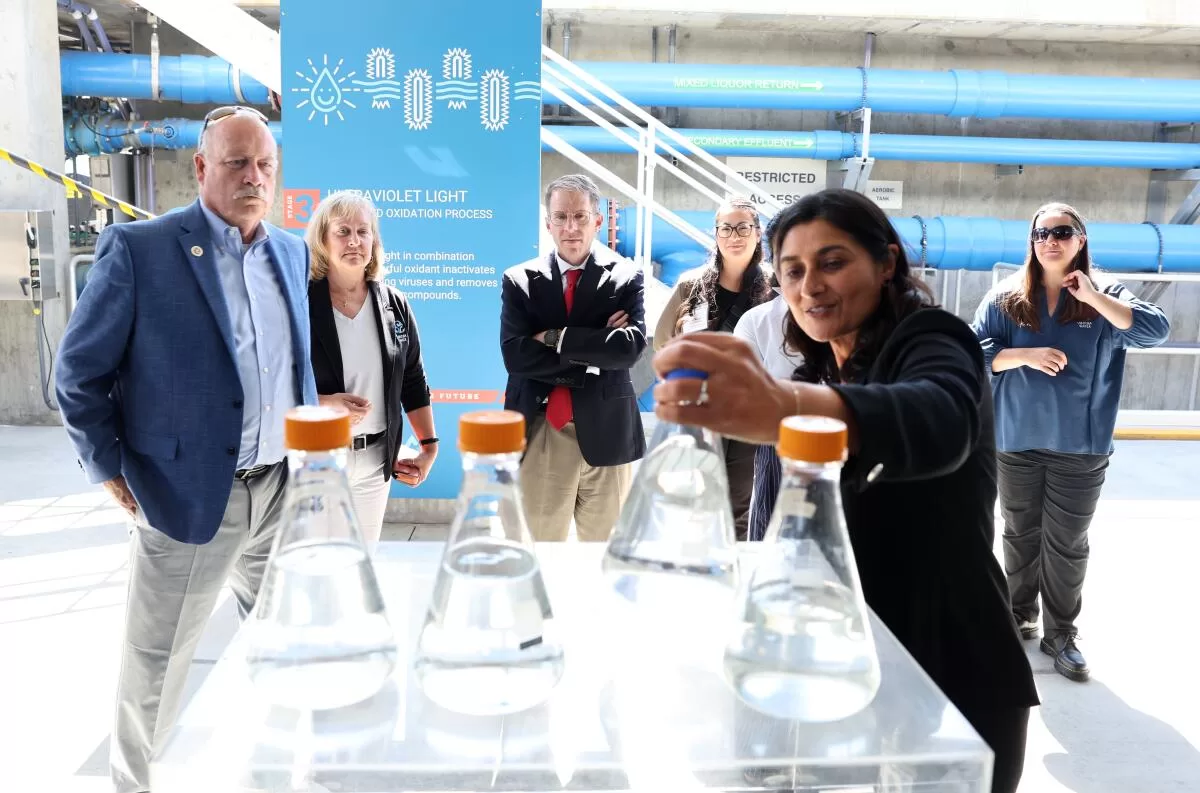The proposed facility, called Pure Water Southern California, is projected to cost $8 billion. When completed, it will recycle enough wastewater to produce 150 million gallons of clean drinking water each day — enough to supply about half a million homes.
“Investments in water recycling and reuse are key to stretching limited water supplies, making systems more resilient to the effects of aridification in the American West,” U.S. Bureau of Reclamation Commissioner Camille Calimlim Touton said. “Water recycling plays a critical role in improving sustainable water supplies. It’s an innovative and cost-effective tool that can help make our water supply more reliable.”
Plans for the facility in Carson call for taking treated wastewater that is currently released to the ocean and purifying it using advanced technologies to produce drinking water. That purified water will be used to recharge groundwater and will also be sent directly into the region’s distribution system to be mixed with other supplies.
“This project will help us provide resiliency, not only for Southern California, but for California and the Southwest,” said Adel Hagekhalil, general manager of the Metropolitan Water District of Southern California, which developed plans for the project together with the Los Angeles County Sanitation Districts.
“This is the future of the West, and we can’t do it alone,” Hagekhalil said, speaking to an audience that included federal, state and local officials at a recycled water demonstration plant in Carson.
(Wally Skalij/Los Angeles Times)
The MWD’s project is one of four water recycling projects that the Interior Department is supporting through grants totaling $179 million. The funds from the Bipartisan Infrastructure Law also include $60 million for two other water recycling projects in Los Angeles and Ventura, and $20.5 million for a project in Utah.
The projects are receiving a portion of the $450 million that the federal government has earmarked for large water recycling projects — part of $8.3 billion included in the Bipartisan Infrastructure Law for water infrastructure projects over five years.
Democratic Sen. Alex Padilla said this type of project is vital for the entire western United States as climate change increases strains on limited water supplies.
“Our fates are interconnected because our water infrastructure is interconnected,” Padilla said, noting that Southwestern states have a common interest in reducing reliance on the shrinking supply from the Colorado River.
“Recycling is part of the bucket. California has shown that we can do it, and we can do it well,” Padilla said. “We need to do it at a big, big scale.”
The MWD previously received nearly $87 million in state and federal funds to support its plan for the water recycling project. Water agencies in Arizona and Nevada have also agreed to contribute to help pay for planning.
Guests tour the Grace F. Napolitano Pure Water Southern California Innovation Center in Carson.
(Wally Skalij/Los Angeles Times)
The Metropolitan Water District, which serves as a wholesaler for 26 member agencies and delivers water for 19 million people, said the latest funds will help advance design work and improvements to existing infrastructure.
The MWD board is expected to vote later this year on whether to approve an additional $300 million in local funds — a 3-to-1 match that is required under the terms of the federal grant.
MWD managers are also advocating for including $1 billion for recycled water projects in a proposed climate bond measure that would go before voters in November.
An environmental review is expected to be completed in late 2025, and the MWD board will then consider whether to move forward with the Pure Water project. The district says construction is expected to begin in 2026, and the plant could start operating and delivering water in 2032.
Last year, the MWD named its water recycling demonstration plant in Carson after Rep. Grace Napolitano, the retiring Norwalk Democrat who has been a vocal supporter of recycled water.
“Water supplies across the west and in Southern California have witnessed increasing strains from climate change,” Napolitano said. “It is my hope that a large-scale project such as Pure Water can act as a blueprint for other regions, encouraging the development of regional drought-proof projects.”
MWD Board of Directors Chair Adán Ortega Jr. said that purified recycled water will provide “a climate-resilient supply.”
Ortega said the $8-billion project, as well as other investments the district is pursuing, will “pass the test of time as the Hoover Dam of our time.”
He described it as building the foundation for a “new and endless river.”
“We’re building an endless river for the Southwest,” he said, “for the next century and beyond.”
